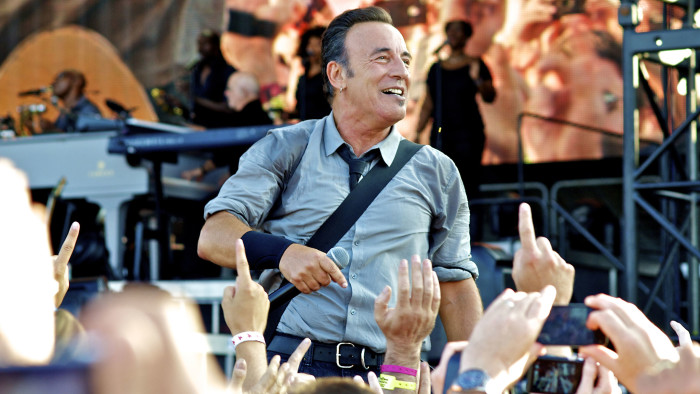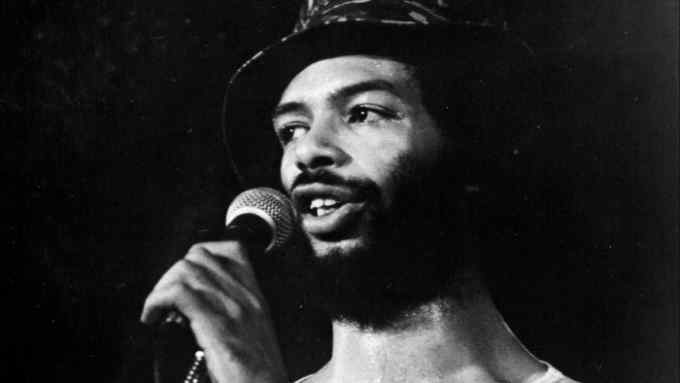‘Born in the USA’ — politicians have missed the anger in Bruce Sprinsteen’s track

Roula Khalaf, Editor of the FT, selects her favourite stories in this weekly newsletter.
In September 1984, Ronald Reagan was coasting towards re-election as president of the US. Addressing a crowd in Hammonton, New Jersey, he paid tribute to a local hero. “America’s future rests in a thousand dreams inside your hearts; it rests in the message of hope in songs of a man so many young Americans admire: New Jersey’s own Bruce Springsteen. And helping you make those dreams come true is what this job of mine is all about,” — the lyrics uncannily like one of Trump’s own tweets.
Springsteen was not pleased. “The president,” he noted drily at his next show, “was mentioning my name the other day and I kinda got to wondering what his favourite album musta been. I don’t think he’s been listening to this one.” And he launched into “Johnny 99”, a stark ballad from the incomparably bleak Nebraska, sung from the viewpoint of a multiple murderer.
Assuming Reagan was not a secret fan of Nebraska, he had probably been pointed towards Springsteen by the columnist George Will, who had recently praised Springsteen’s song “Born in the USA” for its “grand, cheerful affirmation”. In fact, “Born in the USA” tells the story of a minor criminal who gets “in a little home-town jam” and is shipped off to Vietnam, only to return with PTSD, unable to find employment.
Critics musical and political gleefully fell on Reagan’s “error”, confident that they had a better grasp of the nature of American patriotism than the Great Communicator (who, two months later, carried 49 of the 50 states). But if Reagan and Will thought that mood trumped content, they were not necessarily wrong.
As originally recorded, Springsteen alone with a guitar, the song’s anger is transparent. The chorus is flat, affectless. But when he and the E Street Band came to re-record it for the album that would bear its name, they pumped it up. The melody is pushed to the top of Springsteen’s vocal range (in the same way that “The Star-Spangled Banner” crescendos to impossibly high notes) so that the whole song sounds like its own climax. Roy Bittan’s synthesiser fanfare is as bright as cocaine. Max Weinberg’s drumbeats explode like artillery shells. The song sounds like a Roman triumph.
Many excellent songs have come out of mixing pop and politics; the dangerous combination is mixing pop and politicians. Donald Trump’s playlist of campaign songs has had their singers rushing to distance themselves from him, from REM to Adele. He entered the Republican convention in July to the strains of “We Are the Champions”, over protests from Queen’s Brian May.
British politicians have had an equally uneasy relationship with pop, from Harold Wilson courting The Beatles with OBEs, to Tony Blair (a lead singer manqué) wooing and being snubbed by everyone from David Bowie to Noel Gallagher. Another former prime minister’s penchant for early 1980s Mancunian indie earned him a rebuke from Johnny Marr: “David Cameron, stop saying you like the Smiths, no you don’t. I forbid you to like it.”
According to the moral foundations theory propounded by the American psychologist Jonathan Haidt, political progressives stress “care and fairness” while libertarians favour “liberty and fairness”, whereas conservatives also respond to “loyalty, authority and sanctity”. Examining “Born in the USA” through this lens is revealing. Springsteen is famously progressive, and all rock musicians are secretly libertarian, so “fairness” resonates throughout the song. But the chorus also sounds like an appeal to in-group loyalty, and the music is stamped with authority. No wonder conservatives — including Donald Trump, who has of course played it at his rallies — also respond to it.
Springsteen is still infuriating politicians: in the spring he cancelled a concert in North Carolina in response to the state’s new law on transgender access to bathrooms. He does still perform “Born in the USA”, but nowadays it comes with curled, bent acoustic guitar notes, as if Woody Guthrie were performing it in the 1950s. Harder, now, to miss the message. Even for a politician.
Letter in response to this article:
Springsteen conveys his anger with band’s aid / From Ian McMaster

Comments